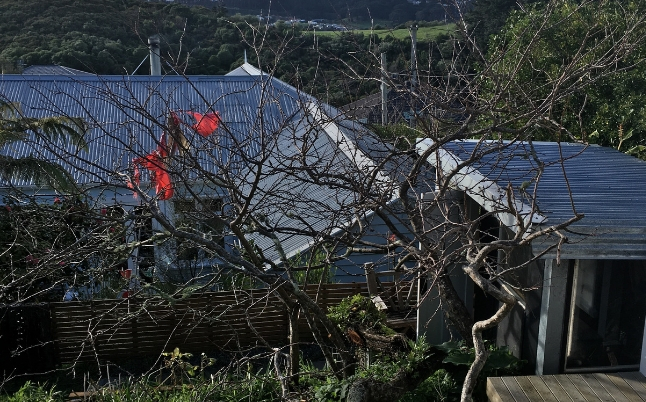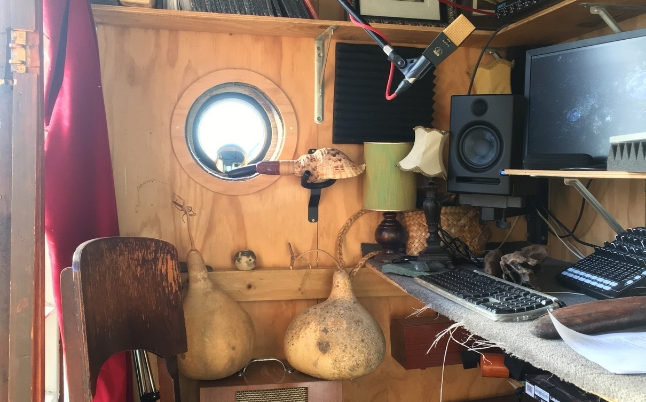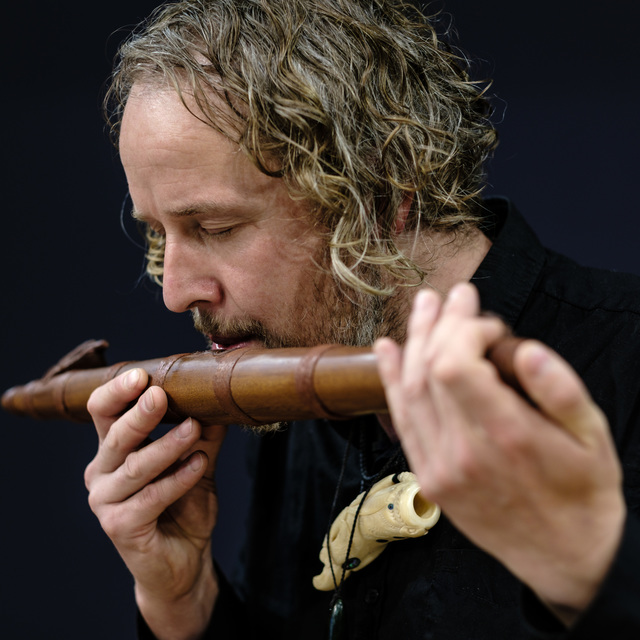What does a typical composing day look like for you?
My day is typically varied. Depending on the music project at hand and what else I have on, I would start about 8-9am and work a solid morning with a coffee or kawakawa tea break at some stage. I always break at 2.40pm to pick my children up from school, so my working day is slightly limited at the moment in that regard, but I do enjoy making the most of the evening and I often work until about 9 pm. I'm more of a morning person, not a late-night worker! I'll also try and break my day up a little and get into the workshop if I'm working on making a taonga pūoro. This routine prevents me from getting in a rut and helps keep both the music-making and taonga pūoro making fresh. The two feed one another. It's an ideal day when I can make music in the morning and make taonga pūoro in the afternoon.
 My house left, The Chicken Coop right.
My house left, The Chicken Coop right.
Please describe the space where you compose your music. What makes this space special and why have you chosen it?
The Chicken Coop is where I do the majority of my composing. It's a repurposed, ah you guessed it...chicken coop. It's quite sunny and cosy in winter and it's great to have the feeling that I'm right in the garden under the plum tree, which provides some shade in summer. When I renovated it from it being derelict, I put in a porthole window which has a view to the Orongorongo Ranges and Mt. Matthews from my chair.
If I need somewhere a little quieter I may move location. Recently, when we recorded a piece for Panthalassa, we had Jake Church and Sam Leamy on electric guitar in my workshop shed and I was in my partner Ruth's shed with the audio gear and pūtōrino.
What equipment (including software) do you have in your space?
I record to laptop and my AKG C414 TL2 is my go to microphone. I usually pair it with another multi-patterned mic and run them in mid-side for a natural stereo sound that sits nicely in the mix. I run these into a RME Baby Face Pro interface and then into Ableton Live. Ableton Live has such an easy workflow that I changed back from Logic Audio to that about 2 years ago and haven't looked back.
I also have a beanbag just in case I have a visitor and they need to get comfortable. Also, a nice place to listen back to music I've created.
 Inside of The Chicken Coop
Inside of The Chicken Coop
Please describe your typical composing process.
It does change with each project. My solo album Toitū Te Pūoro has a definite kaupapa and so the creation story I was inspired by is represented in the music by the taonga pūoro that represent different aspects of this story through either their voice or the whakapapa of the taonga pūoro. I had a clear picture from the start of how the album would take shape and which pūoro I would use and where. But I do often follow my nose with composition and let myself be taken where I'm being led to by the wairua.
I've just composed music for a 20 part series for Māori TV, He Paki Taonga. Each episode launches its story from a taonga held at Te Papa and so I allow this taonga and the action of the pūrākau to guide my choices.
What are you currently working on in your space?
I’m working on a collaboration and also an intro/outro soundtrack for a pre-Treaty of Waitangi radio documentary. The collaboration will be out next year. Panthalassa has just been released. Sam, Neil and I produced this album and also did much of the pre-mix in The Chicken Coop before passing it on to Steve Garden at Rattle Records for the final mix. Panthalassa is out now through Rattle Records.
SOUNZ blog is designed for expressive discussion and debate amongst the arts and broader community. This is intended to be a safe space so please remember to keep comments respectful and avoid personal attacks, criticisms of specific organisations and defamatory language. Comments are moderated to ensure that they comply with SOUNZ’s Community guidelines.
